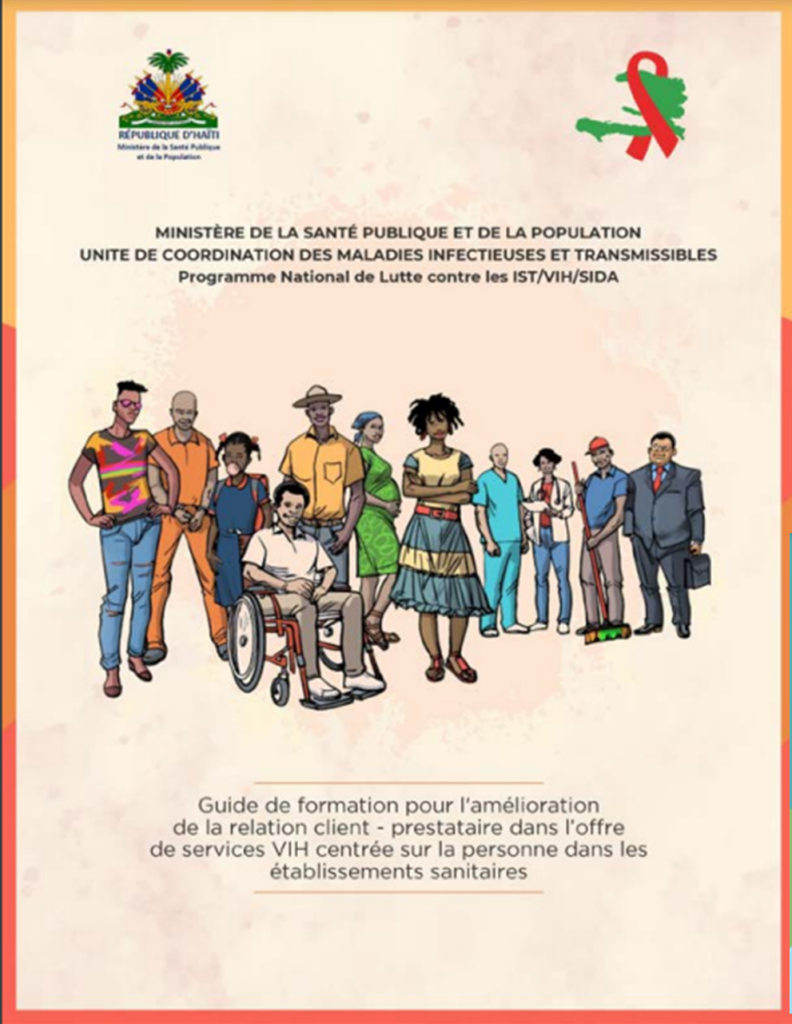Building an Equitable HIV Response through Stronger Patient-Provider Relationships
Building an Equitable HIV Response through Stronger Patient-Provider Relationships

In Haiti, progress in reaching people living with HIV with antiretroviral treatment and HIV care has stalled, with high rates of new clients not returning to facilities for continued care. High levels of HIV stigma amongst the Haitian population, including those who work at health facilities, contribute to this situation. HIV patient advocacy groups have reported serious complaints about the lack of compassionate treatment and feelings of isolation at health care facilities.
Nurse Emmanuela Fedia Petit Homme Fleau, who works at the Centre Espoir des Promoteurs Objectifs Zero SIDA in Port-au-Prince, has noted this firsthand. “At the facility, the customer service is very limited. The support staff is not trained at welcoming the clients, to serve them with respect or to understand the psychological burden of the disease.”
To address this, the Ministry of Public Health and Population (Ministère de la Santé Publique et de la Population, or MSPP) and its National HIV Program partnered with the RISE-SPOTLIGHT project to develop and begin rolling out the country’s first-ever comprehensive set of training guidelines for health facilities providing HIV services. RISE, funded by USAID and PEPFAR and implemented in-country by core partner Management Sciences for Health and local partners Fondation SEROvie and Faculté de Médecine et de Pharmacie de l’Université d’Etat d’Haiti, works to strengthen the relationship between clients and providers and build an environment that enables the equitable provision of quality services and motivate patients to seek and remain in care.
The Training Guide for Improving the Client-Provider Relationship in Person-Centered HIV Service Delivery in Health Facilities covers human rights, gender, motivational counseling, and customer service within health facilities, and provides concrete examples to help facility workers deliver quality and stigma-free HIV services. One critical component in its development was the input from members of community service organizations (CSO), representing key populations who face unequal availability and quality of HIV treatment services, including men who have sex with men, transgender, youth, and sex workers. Consultative meetings with CSO representatives provided valuable information on improvements they would like to see within the health facilities.
For Mathilde*, a CSO representative and young woman living with HIV, this effort gives her hope that no one will experience the same violation of trust as she did after a nurse shared her status with her community. “Because of this, I was in denial and hid my status. I didn’t want to go the health facility for treatment because people might see, due to my presence there, that I was HIV positive,” recalls Mathilde.
Since its approval by the MSPP in May 2022, RISE-SPOTLIGHT has trained 332 staff on the use of the guide, including doctors, nurses, and administrative staff in 112 health facilities across the South, West, Artibonite, North, and Northeast departments. By the end of the training, each facility developed an improvement plan that identifies how those trained will work with other facility staff to change attitudes and practices to assure a better client/provider relationship.
As CSO representative, Mathilde also helped facilitate the training of trainers and was optimistic about the change it could bring in others, as it did in herself. “The training will help other young people who face the same problems I did. It helped me find courage to participate in youth groups, and now, I am able to help other young people understand the impact stigma can have.”
Dr. Joelle Deas Van Onacker, coordinator for the National HIV Program remarked, “This training manual enables us to respond to the constant challenges of the availability and accessibility of care in a humanizing environment where the patient is taken care of in its entirety with a constant concern of for their well-being.”
For Nurse Petit Homme Fleau, the training guide is essential: “Now I better understand certain concepts that I may have minimized, like the support relationship, the customer service. I am making efforts to spend more time with my clients, and to ask them how they feel and identify when it is necessary to refer them for psychosocial support. I hope that all providers – medical and non-medical staff – will implement those concepts during their daily tasks.”
*Name changed to protect privacy